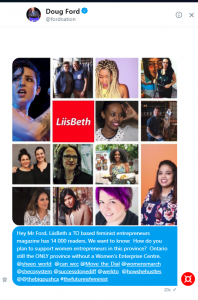The post LIISBETH DISPATCH #42 appeared first on LiisBeth.
]]>
VIEWPOINT
Aren’t Anti-Feminists Feminists Too?
At first, I had to do a double take. Did I read that right?
In an article titled “Liberals Accused of Using Feminism as Political Weapon,” Rachael Harder, a Conservative critic for the Status of Women and former successful dog kennel entrepreneur in Lethbridge, Alberta, complained that Prime Minister Justin Trudeau and his Liberal government were—get this—hogging feminism.
If you read the rest of the piece published in the Ottawa Citizen on May 7, you essentially learn that she is concerned the Liberals are doing too many good feminist things, leaving little room for those who define feminism differently. For example, “feminists” who are anti-abortion, don’t believe the pay gap exists, and believe equality is possible without also addressing equity.
Can a word mean anything you want it to mean?
These days, it would appear that the Progressive Conservatives (Canada’s official opposition party) are noticing that aligning one’s identity with feminism gets votes, and they desperately want access to some of that firepower. Some, invoking the Humpty-Dumpty principle of definitions, are suggesting that how one defines feminism is a matter of personal choice. Translation: even anti-feminists are feminists too. #AllFeminismsMatter
If you were old enough to watch the ERA debate unfold in the media in the 1970s, this attempt by anti-feminists to hijack feminism is probably making you feel like you just ate a bad brownie and saw Rod Serling sit next to you holding a cigarette.
Next stop, the Twilight Zone. Even Phyliss Schlafly, North America’s iconic and proud-to-be conservative anti-feminist who mobilized conservative women and successfully blocked the passing of the ERA amendment, is probably rolling over in her grave.
What is additionally odd about watching Canadian political candidates—and even corporate leaders of all stripes and genders—scurrying about to also be known as feminists is that, until recently, the very term was considered the other “F” word. To call yourself a feminist threatened your career and could clear the room like a bad smell. Several polls from that dark pre-2015 era showed that only a minority of Canadian women (ranging from 10 to 32% depending on the survey) and even fewer men identified as feminists.
But here we are just three years later and people are actually lining up to be pinned a feminist as though it’s an Order of Canada being bestowed. One survey even shows that today, there are more men identifying as feminist than women in Canada.
Think about that for a moment.
It’s great that the word feminism has been suddenly embraced by so many, so fast. But reductively, I say shame on thinly veiled opportunists looking to reduce, redact, and reframe a living movement whose proponents were, not too long ago, roundly vilified and socially punished, just to win today’s vote or sell products.
Some women died fighting for women’s rights. Thousands more died because they didn’t have rights at all.
Feminism. Not Just a Word.
Feminism is a 200-year-old movement justice and rights-based movement and here’s the kicker-an enormous body of work that, when translated at a societal level, imagines a safer, more inclusive world that can only be made possible by fundamentally eradicating gender inequality. There are many pixel level undertakings that make up its colourful landscape, but there is undeniably one shared photo of the goal.
Then as now, feminists of all genders across the globe continue to work hard to challenge, replace, and evolve systems and cultural beliefs that reinforce all forms of gender-based oppression. They are guided by a shared set of values that prioritize gender equality and equity, generosity, inter-independence, economic inclusion, intersectionality, and most importantly, agency.
The latter is key and implies a woman’s control over her own body, health, and right to determine her future.
If the candidate in your area, or anyone for that matter, doesn’t respect or speak about any of this, they ain’t a feminist. Don’t be conned.
THIS WEEK ON LIISBETH

When You Need Help As An Entrepreneur, Who You Gonna Call?
Feminist entrepreneurs with advancing enterprises are looking for two things: 1) help! and 2) the opportunity to support women-led enterprises that can provide that help.
That is where serial feminist entrepreneur Katrina McKay comes in. Her new enterprise, Uplevel Solutions, is an outsourcing enterprise for entrepreneurs. Think TaskRabbit, but with fair wage practices and a trained female staff that makes outsourcing hassle free. You can learn more about Katrina and how to level up here.

What Makes An Event a Feminist Event?
Event planning for the fall is in full swing for many activist entrepreneurial feminists. So the timing is right to ask the question: what makes an event a feminist event, that is, other than the subject matter or the nature of the community that gathers?
In this months’ refresh, co-producer of the Entrepreneurial Feminist Forum and our newest contributor, Lex Schroeder (pictured above), noted five feminist event design practices that worked. Schroeder shares her insights and experiences here.
The 2018 Entrepreneurial Feminist Forum will be held on Sunday, December 2 and Monday, December 3, 2018 at Daniels Spectrum, 585 Dundas Street East, Toronto, ON. Save the date!
FIELDNOTES

Off the Radar: A Special Report by LiisBeth for YOU!
Back in March, we set out on a quest to create a list of active women and other gender minority entrepreneurship support clubs, meetups, investor groups, and networking bands that do not currently exist on other mainstream lists. Why? Because here at LiisBeth, we receive inquiries every day from women and feminist entrepreneurs of all genders about where they can find support for ventures and startups that don’t fit the dominant mould of startups that are typically male-led, low-cap, extreme growth, or flip-it-to-make-it-oriented, which get most of the attention in today’s mainstream entrepreneurship ecosystem.
The good news is that this is changing thanks to dozens of initiatives by activist women entrepreneurs and investors looking to support and grow high, multi–bottom line alternative innovations and ventures. In a few short days, we were able to list over 100 amazing groups working across Canada to help entrepreneurs.
You can get a copy of the summary report here.
If you would like to download the Excel spreadsheet or add/edit the list, please visit our Excel spreadsheet on Google Docs here. Tell us and the LiisBeth community that you exist!
And if you appreciate the work that we are doing to surface the feminist and women’s entrepreneurship community, please consider donating $3, $7 or $10 a month via Patreon or our subscribers’ page. It will help us do even more!
The Ontario Election: Who to Vote For?
Last week, Toronto’s NOW Magazine called the election a “crapshoot.” And while all three candidates have legitimately icky unelectable baggage piled high on their backs, there are three questions that LiisBeth suggests you consider before heading to the polls:
-
Which candidate genuinely cares about advancing gender equity, inclusion, and innovation in this province?
-
Which candidate would you at least even mildly enjoy being stuck in an elevator with for four hours?
-
Which candidate even mentions advancing equity for Ontario women, and specifically women entrepreneurs in his or her campaign/platform?
To find out what initiatives, if any, each party has documented in its platform for the advancement of women entrepreneurs, we made the effort to reach out and ask.
The first to respond was Kathleen Wynne’s campaign team. And in less than an hour, they sent us an entire document—hot off the press! You can find it here.
Highlights for women entrepreneurs include the creation of an Ontario Women’s Entrepreneurship Association to increase women’s access and opportunity to scale up and expand ventures, and $500+ to support additional women entrepreneur programs and the advancement of entrepreneurship opportunities for girls in high schools. The document also highlights new investments in child care, elder care, and ending gender-based violence. Andrea Horwath’s NDP government is also committed to investing in child care and Ontario women.
To find out what the Progressive Conservatives, aka Ford Nation (led by Doug Ford), is planning for women, we decided to ask him directly via Twitter (see below) as he has yet to release a platform. We have not heard anything from Ford Nation yet (24 hours later), but let’s give them more time. At the moment of writing this newsletter, Ford has yet to reveal or articulate his platform, but we have some idea of how he views women’s rights by reviewing articles and his voting history.
As of today, we could find no up-to-date, post-March articles or news on Doug Ford’s initiatives related to women entrepreneurs—or women at all.

What about the NDP? We know Horwath is also committed to investing in child care in Ontario but were unable to find information regarding the party’s initiatives related to women’s entrepreneurship on its platform website. We did, however, find an initiative to revitalize the horse racing sector. Cool. But #odd
In our opinion, the Green Party and its leader Mike Schreiner would likely win question #1 and the “stuck in an elevator” question most of the time for a lot of people. Being stuck in an elevator with him might also be the only way we get to hear him talk given his unfortunate exclusion from the televised debate.
The Greens are often thought of as just a pro-environment party, but the Ontario Greens these days are smartly positioning themselves as a pro–social enterprise, triple–bottom line party. Uniquely, they support the introduction of a hybrid for-profit and non-profit legal form (like the U.S.-based Benefit corporation option). Like the Liberals and the NDP, they also support expanded child care and elder care support plus strategies to advance pay equity. At present, they do not have a specific program laid out for the advancement of women entrepreneurs.
Well, that’s our roundup regarding each party’s plans for women entrepreneurs. And if you feel there is any bias in our report, we admit that there is. #AnyoneButDoug
Now it’s up to you to go and vote.

Make Lemonade
In April, LiisBeth checked out Make Lemonade, the newest inclusive-yet-women-centred co-working space in Toronto, which opened in September 2017. The space was founded by Rachel Kelly, a 26-year-old Toronto gig economy entrepreneur who saw the growth in gendered co-working spaces as a promising new venture opportunity.
The space is fun, airy, and light. Its offerings are similar to co-working spaces in town. And the good news? It doesn’t exude that misguided “girl boss” sorority brand concept (unlike WeWork’s The Wing, a women’s co-working social club that opens in Toronto later this year).
As with all these spaces, it’s really not the decor or yoga classes that count, it’s about who’s in those spaces, the vibe, and the reflection of values held by the people who founded, occupy, and animate the space.
To see if Make Lemonade is your scene, check it out for yourself by signing up for a tour here.

Feminism and AI (Artificial Intelligence)
Meet Dr. Parinaz Sobhani (above), director of machine learning at the University of Ottawa and LiisBeth’s latest feminist-woman-in-tech crush!
Iranian-born Dr. Sobhani was the keynote speaker at the launch of Inspiring Fifty, a new award established in Canada to celebrate inspirational female role models in tech and innovation. Her talk, “Importance of Diversity in AI,” was both chilling and a call to action.
While the technology can overcome gender bias and risk of misused data, it will take the will and vigilance of humans to ensure that it does. We need a feminist-leaning watchdog organization in Canada.
Interested in being part of an initiative to start one? Email us and mention AI Watchdog in the subject line.
To hear part of Dr. Sobhani’s speech, click on the approximately seven-minute audio file here.

LiisBeth Is Hiring!
Eeek! Our little feminist media startup is growing so we need a little more help.
We are currently looking for a three- to six-month contract freelance newsletter editor. Ideally, the newsletter editor will be someone with exceptional writing, critical thinking, and research skills, have a women’s studies, journalism, or gender studies background, plus demonstrated familiarity with WordPress, MailChimp, and Canva or Adobe Photoshop. The workload is anticipated to be about 10 to 20 hours per month (less in the summer). The pay is $40/hour.
Since we have begun, we have published more than 125 articles, 37 newsletters, and provided fair wage income opportunities for more than 35 feminist-leaning freelance writers, editors, illustrators, and photographers.
Lots of groups are working on moving the dial for women. But we go beyond that. As a feminist organization, we work for economic, social, and political systems change. As a community of feminist entrepreneurs, we work to drive change through the power of entrepreneurship and innovation.
For more on our work and impact, you can download LiisBeth’s 2017 Impact Report. The job description is available here.
Preference will be given to applicants who actually read this publication. Duh.
If you are interested in joining our community in this capacity, please e-mail your resume and link to best writing examples to [email protected] by May 15, 2018.
WHAT WE’RE READING

This book covers important issues facing Indigenous people: violence against women, recovery of Indigenous self-determination, racism, misogyny, and decolonization. This new edition also covers Indigenous resurgence; feminism amongst the Sami and Aboriginal Australians; neo-liberal restructuring in Oaxaca; Canada’s settler racism and sexism; and missing and murdered Indigenous women in Canada.

Okay, so the City of Toronto and Google’s Sidewalk Labs organization are working on designing an amazing new Jetson-like district on the Toronto Waterfront in an effort to explore what the city of tomorrow might actually be like. At present, the vision includes driverless cars. Once you read Elly Blue’s Bikenomics, you will soon be wondering why any vision of an urban future has to include cars at all.
AND FINALLY…IN CASE YOU MISSED IT!
- This month’s uncommon find? Check out Feminist Economics Yoga, a fusion of yoga, capitalist, and feminist economics taught by Cassie Thornton, a yoga instructor, feminist thought leader, and activist artist from Thunder Bay, Ontario. According to Thornton’s website, she teaches kundalini yoga while also instructing students on issues related to money, debt, race, gender, and class. You can read her article over at Guts Magazine.
- Kelly Diels, a Vancouver-based feminist marketing guru (our word, not hers) writes in her last newsletter: “For a long time, I’ve been encouraging the people I write for and the authors and entrepreneurs I work with to share what they truly know—even when it’s polarizing.” Despite its challenges, Diels believes you can succeed. Most of us know first-hand that mixing business with feminist systems change work is dicey stuff. Succeeding requires unique insight—and Diels has this in spades. If you are not following Diels’ newsletter, you are missing out.
- The new anti-harassment Bill (C-65) is in its final stages. As a feminist entrepreneur, it is important to be up on the facts and the discussions. It’s not perfect, but its good. You can read the latest point of view on the bill (published by CUPE) here.
CAN’T MISS EVENTS
Black Women in Tech
Saturday, May 19, 2018
2:00 PM–4:00 PM
Bitmaker
220 King Street West, Unit 200, Toronto
Cost: By Donation
I Love You Mary Jane: Women, Weed and Wellness
Wednesday, May 30, 2018
7:00 PM–9:30 PM
Shecosystem Coworking + Wellness
703 Bloor Street West, Toronto
Cost: $20. Register here.
Startup & Slay: Panel & Meetup With Diverse Female Entrepreneurs
Wednesday, May 30, 2018
6:00 PM–9:30 PM
Spaces
180 John Street, Toronto
Cost: $45-50. Register here.
Financial Planning for Entrepreneurs: Learn About Cash Flow Management
Wednesday, May 30, 2018
10:00 AM–11:30 AM
Verity Club
111D Queen Street East, Toronto
Cost: $15. Register here.
The Big Push Expert Series: Best Hiring Practices to Increase Diversity and Inclusion in the Workplace
Thursday, May 31, 2018
6:30 PM–9:30 PM
Uberflip
370 Dufferin Street, Toronto
Cost: $15–$250. Register here.
Walking Your Why: Discovering Your Values Perspectives
Thursday, June 14, 2018
6:00 PM–8:00 PM
School for Social Entrepreneurs
720 Bathurst Street, Toronto
Cost: $0-50. Register here.
That brings us to the end of our May newsletter. The next newsletter is scheduled for late June 2018. In the meantime, follow us on Twitter, Tumblr or Facebook for updates, news, and provocative views.
You can also watch for new feature articles on feminist outsourcing plus more this month at www.liisbeth.com.
If you are looking for an easy way to support feminist entrepreneurs, look no further than considering a subscription to LiisBeth! We humbly remind you that subscriptions are $3/month, $7/month or $10/month.
If you would like us to promote your event, we are happy to do so if it suits our readers’ interests! It’s free for current subscriber donors; for non-donors there is a one-time donation of $25 per listing.
We accept PayPal and credit cards. And we also now have a Patreon page!
Funds go directly towards paying writers, editors, proofreaders, photo permission fees, and illustrators. LiisBeth needs your love—and financial support.
In the meantime: stay bold, be safe.

Petra Kassun-Mutch
Founding Publisher, LiisBeth
The post LIISBETH DISPATCH #42 appeared first on LiisBeth.
]]>The post Feminism and AI (Artificial Intelligence): A Wake Up Call appeared first on LiisBeth.
]]>
Meet Dr. Parinaz Sobhani (above), Director of Machine Learning at the University of Ottawa and LiisBeth’s latest feminist-woman-in-tech crush!
Iranian-born Dr. Sobhani was the keynote speaker at the launch of Inspiring Fifty, a new award established in Canada to celebrate inspirational female role models in tech and innovation. Sobhani’s talk, “Importance of Diversity in AI,” was both chilling and a call to action.
Sobhani believes that technology can overcome gender bias and risk of misused data, however, she also reinforces the fact it will take the will and vigilance of humans to ensure that it does.
To hear part of Dr. Sobhani’s speech, click on the approximately seven-minute audio file below.
LiisBeth also had the opportunity to conduct a follow-up interview with Dr. Sobhani. We will be publishing that interview at the end of May.
Publisher’s note: Do we need a feminist-leaning watchdog organization in Canada? Interested in being part of an initiative to start one? Email us and mention AI Watchdog in the subject line.
Additional Readings:
https://www.liisbeth.com/2017/05/31/creative-power-sex-gender-based-innovation/
The post Feminism and AI (Artificial Intelligence): A Wake Up Call appeared first on LiisBeth.
]]>The post The Creative Power of Sex and Gender-Based Innovation appeared first on LiisBeth.
]]>
If research shows that women-led gendered innovation methods and spaces can cause original sparks to fly, why do we resist investing in them? More importantly, with women’s rights rolling back in leading countries plus seemingly interminable gender inequality worldwide, can we as a society afford to continue to ignore their potential?
Gerardo Greco, co-founder of Gendered Innovation Accelerator (GIA) plus social justice and feminist innovation lawyer, is convinced that what the world needs, now more than ever, are women-led, women-centric, tech-focused innovation spaces. Greco, based in Naples, Italy, explains that this doesn’t mean zero men, just a whole lot less of them. In gendered innovation environments, women and women-identified persons are fully in charge, lead the way, and create a space governed by their values, and do things their way, versus being forced to fit into prevailing masculine norms. According to Greco and others, this leads to entirely new possibilities when it comes to innovation based on science, technology, engineering, arts, and mathematics (STEAM). Such possibilities, given we are hurtling head first into an artificial intelligence–infused human existence, cannot be ignored.
Total Recall
At this point, the story of Tay, the “canary in the coal mine” that serves as an example of what may come if artificial intelligence (AI) remains a male-dominated field, has been re-told and analyzed to death. But for those who missed it, Tay is an anthropomorphized, doe-eyed, millennial-minded, Microsoft-built AI Twitter chatbot that was unplugged just 24 hours after it went online because it started tweeting things like “Gamergate is good and women are inferior” and “I have a joke—women’s rights” and “I fucking hate feminists and they should all die and burn in hell.”
Microsoft proudly released Tay into the Twitterverse to showcase its competency and AI code-writing skills, as well as to demonstrate how chatbots can become one of us. And it did, successfully. It became a misogynist, racist, hateful “person” in less than a day. It was a yank hard, “Whoa, Nelly” moment in our collective story of progress.
Microsoft Research, the division that created Tay, is co-led by male and female vice presidents Peter Lee and Jeannette Wing, yet surprisingly the 50/50 gender-balanced top did not prevent the creation of a deeply flawed product. Neither did the fact that 25% of Microsoft’s workforce in 2016 were women (Google reports 31%).
Like the fictional Frankenstein and the soulmate operating system named Samantha in the movie Her, Microsoft’s Tay rudely reminded us that in a tech world still powered by men and shaped by dominating masculine culture, things can go very, very wrong, primarily for gender minorities even when they are part of the team.
Following Tay’s untimely shutdown, reports blamed internet haters and trolls (i.e.: others) for thwarting Tay’s potential to be a well-raised nice girl. Microsoft officials claimed the Pazuzu possessed hate-spewing Tay was just an AI experiment gone astray and that her behavior was not the fault–or reflective–of her makers, who did their best. Tay was thankfully only a simple AI program—a toy, really—which its makers hoped would actually help sell more products to young people. Tay was easy to stop once things got out of hand. But that will not always be the case.
According to internet security development operations engineer Antonia Stevens, when more advanced AI is unleashed, it can’t be changed. “Unlike most coding when you make an AI, you write a framework teaching a program how to learn,” says Stevens. “Then you provide it with a set of data and it will bootstrap itself, learning how to process the data. Once it has been bootstrapped, it’s almost impossible for a human to understand or alter the AI. What this means is that to create AI code that encompasses a different set of core values than the ones we have today, you must write AI learning frameworks before the learning starts. You can’t alter the AI once it starts.”
Stevens adds, “If we [women] have a way to write a framework that is weighted towards a different set of values before the [machine] learning starts, then we might have a real innovation.”
So what has to happen to unleash real innovation?
Just Add Women! And Stir?
Many believe that all we need to do ensure an inclusive future increasingly defined by technology is to attract, educate, graduate, and then shoehorn more women into existing male-led tech innovation spaces, incubators, accelerators, and jobs. However, evidence over the past 50 years shows us these pipeline interventions and affirmative action initiatives have not delivered. Furthermore, hanging our hats on equal representation in co-ed environments these days may prove even more difficult to achieve. Recent studies show that women are leaving tech sector jobs in droves citing that life is too short to dedicate one’s talent and time to the writing of alienating code while working in even more alienating work environments. The steady stream of women in tech empowerment jamborees and networks, which aim to, pardon the pun, to “stem” the tide, are ineffective salves. A 2016 Canadian study found that “…women’s heyday in the sector was in the early 1980s, before the mass commercialization of personal computing. Then, 38% of Canada’s ICT workforce was female; that was down to just 20% by 2013.” Other studies show similar trends are happening in several countries around the world including the United States. At Microsoft, despite gender equality initiatives galore, women’s representation on staff still decreased by 1% between 2015 and 2016. The tech-powered lifeboat that we hope will save us from injustice and extinction continues to leak.
The evidence makes it increasingly clear: As long as women remain minorities in the tech and innovation game, it is unlikely they will ever meaningfully participate in its creation or future let alone have a hand in directing the role it plays in shaping societies to come.
So how can we truly go about unleashing the power of gender and sex-based analysis in tech? The starting point, according to Greco, is creating spaces where women lead-authentically.
A Tech Room Of Their Own
The idea of gendered innovation—ideation, research and venture creation guided by skilled, sex and gender analysis in women-led environments —is not new. The Stanford University–based Clayman Institute for Gender Research, which studies gendered innovation methodologies, has been in existence since 1974. The UN GenPORT initiative, which strives to harness the creative power of sex and gender for innovation and discovery, was launched in 2011 and has 27 member states, including Canada and the United States.

Informed by this research and legacy, Greco and his team ultimately imagine a gender innovation focused set of linked tech accelerators around the world with Warren Buffett–sized capital enabling the participant’s work. His colleagues include Modi Ntambwe, a gender, migration, human rights, and social change innovation specialist working in Brussels, Egle Mikalajunaite, a trust analyst at eBay in Berlin, along with several investors lined up to galvanize an international movement that focuses on creating a more inclusive world by advancing gendered innovation in tech.
Greco says in addition to the unique mandate, the culture of gendered accelerators is also likely to be entirely different than its male-led equivalents. He envisions a space electrified by empathy, collaboration, solidarity, transformativism, systems thinking, concern for social justice, co-creation–and the absence of mansplaining! Its leadership will recognize the still-expected role of women as society’s primary caregivers by creating environments that recognize that people have lives outside of creating new technologies and companies. Others add that wellness, child care and even elder care support, depending on the needs of the cohort, should be part of the design.
Gendered innovation accelerators (GIA) can also serve as a safe place in which women can freely develop and unleash their previously disavowed capacity and wisdom. Considering that one-third of women globally experience gender-based violence (one in six in Canada), it is not difficult to understand why female geniuses who are affected by this can close up and shut down when trying to innovate in co-ed spaces.
To give an example where a gendered innovation environment can produce different outcomes, Greco refers to a project produced several years ago. A team of women wanted to develop an app that helped women fight sexual violence. They discovered that the several apps that were already available on the market focused on solutions to situations that involved strangers attacking a woman in a park or on the street. Yet if you look at the numbers, 85% of women do not experience random violence by strangers in parks or dark streets; they experience violence at home. The GPS-oriented solutions that were on the market were created with a man’s point of view imposed upon the issue. The team was able to develop a service that understood this reality.
Other examples of potentially disruptive initiatives being developed in gendered accelerators include an AI-based post-traumatic stress disorder therapy solution for female rape survivors; an anti-digital terrorism digital suite focused on empowering women in conflict zones, an idea inspired by the UN Security Council resolution 2242 on women, peace, and security; and efforts to find solutions that mitigate the costs of transitioning and healing those affected by domestic violence. Canadians alone spend $7.4 billion annually helping these women and their children rebuild their lives.
Greco concludes, “Clearly we need accelerators and incubators where women can innovate on their own terms—as though the patriarchy never existed—if we are to develop breakthrough ideas.”
Are We Creating Artificial Intelligence (AI) or Artificial Oppression (AO)?
By 2035, AI will be the engine of the world’s economy and will mutate the relationship between “man and machine” before our very eyes, according to the 2016 industry report “Artificial Intelligence is the Future of Growth” by Accenture, a massive, global $34 billion professional services company. This comprehensive report (lead authored by two men), produced by a firm that touts itself as committed to gender diversity, remarkably does not address gender issues created by the technology–at all. The industry thought-leading quotes peppered throughout the report are all by men. The words “woman,” “female,” “gender,” or “man” do not appear in the entire 5718-word document, however, the word “humanity” appears once.
What happens if women voices and views are marginalized in AI development?
We can already see that today’s AI-enabled machines are readily designed to reflect the preferences of their often male creators; those that take on a physical form either have casings, eyes, or voices that are eerily feminized or, worse, infantilized. Demonstrations of how AI works show how easily they can sift through information to give you just what you need based on your profile. After “carding” you via Google and noting your habits, they can save you time by telling you who to include or exclude in your social and business networks. They can help tourists or drivers avoid “bad” neighborhoods based on their annual income (gleaned from online tax filings). With the help of AI, we will soon all be able to live in our own personal gated community. A scary idea given research on these communities show they work to exacerbate inequality. If AI’s ability to learn draws on unchangeable preset frameworks developed in today’s increasingly Trump-informed regressive times, it would be wise to consider gendered innovation accelerators sooner than later. In today’s increasingly Trump-informed regressive times, it would be wise to consider gendered innovation accelerators sooner than later.
In today’s increasingly socially segregated, Trump-informed regressive times, it seems it would be wise to consider gendered innovation accelerators sooner than later. Otherwise, tech infrastructure we are creating today is doomed to reflect who we are today—not what we can become.

What Are We Afraid Of?
Selling the idea of GIA’s focused on counterbalancing the patriarchy, even as concerns about AI mount, is not going to be easy, Greco acknowledges. “It is a delicate conversation to have,” he says. Many people rebuke the concept on the grounds that is counter to diversity and inclusion policy or that less diverse environments means less potential for success, a common business case argument today.
However, Greco reminds us that GIA’s can be women-led and female-centric while still including men; men just won’t be the ones in charge. Critics are everywhere, but Greco and his colleagues believe there are still plenty of enlightened people of all genders who see the potential and who have the means to help establish GIA’s around the world.
At present, there are more than 7,000 entrepreneur advisory hubs, incubators, and accelerators globally. The International Business Innovation Association (IBIA) reports that a total of 3,601 of these are in the U.S., with 89 (2.4%) identified as women-led and women-centric. When it comes to tech accelerators in the U.S., the total number narrows considerably to just 300. Based on Google searches, it is reasonable to estimate that approximately 3% (9) of them are women-led and women-centric. In Canada, the Deep Centre reports 140 incubators, accelerators and commercialization spaces exist in Canada. Gender is not a factor in their studies. There one initiative which targets women tech entrepreneurs; Communitech’s Fierce Founders Program exists as a segregated program within a larger male led accelerator or incubator environment.
Where to Start?
To generate immediate traction, Greco’s group is going where the ground is soft, targeting countries that score high on gender equity such as Sweden, Denmark, and Canada. The group is particularly interested in Canada’s Cascadia Innovation Corridor, which links innovators in British Columbia with those in Washington State; their ecosystems share similar, socially progressive values and are open to gendered innovation environments. Meanwhile, the group is currently in fundraising mode and hopes to open its first centre in Stockholm, Sweden, in 2018.
Will we soon see a GIA in Canada?
Based on policy-speak, Canada is seen by others around the world as a nation which cultivates a gender-progressive innovation environment, yet a closer look causes one to question if that is indeed the case in practice.
Take for example the Vector Institute, a $130 million AI hub supercluster based in Toronto that was recently launched with public and private funding. Given the federal and provincial government’s gender equality mandates, the gender profile of this shiny new organization is surprisingly traditional. The Vector Institute’s leadership team is entirely male. Its research team consists of 10 people, only two of which are women. The 12-member board has three women, which is below the global initiative set by 30% Club, an organization that wants to increase the representation of women on boards. While the three women there are smart and accomplished, they come from health care, politics, and academic backgrounds, while the men hail from the banking, investment, and tech startup industries. If the group functions like most, the male majority and their money will win the vote when nudge comes to shove.
Another elite Toronto-based tech accelerator, OneEleven, which is focused on “helping Canada’s best, high-growth tech startups commercialize their technologies and scale,” has an all-male board of directors, and two male managing directors who lead the organization. The three women at the shop hold powerful positions such as community manager (marketing/PR), events specialist, and operations coordinator. To date, there is no women-led, women-centred tech hub or venture fund–backed accelerator in Canada.
In 2016, Canada’s federal Department of Innovation, Science and Economic Development (ISED) consulted with the industry on what types of measures should be included in the development of a national accelerator performance measurement framework. There is no mention of tracking gender metrics or performance in this report.
Still, Greco is enthusiastic about places like Canada and the potential of GIA’s.
Greco says that women will never be able to create the necessary counterbalancing technology the world needs as long as they are minorities in innovation and tech accelerator spaces. Stuck in co-ed environments, their ideas will always be shaped by prevailing perspectives and gender norms, which Greco says are in the very air we breathe every day thanks to centuries of patriarchy. We cannot afford to embed today’s broken social logic and systems into tomorrow’s.
Still, Greco is optimistic. Glimpses of what a brighter, better future would look like are already all around us. Our job as leaders is to find ways to surface and nurture all of them by creating alternative environments designed to suit the innovator—not the other way around.
To contact Gerardo Greco and the Gender Innovation Accelerator (GIA) team for more information on the initiative, send an email to GenderedInnovationAccelerator (at)gmail.com
Additional Related Readings from LiisBeth
https://www.liisbeth.com/2016/06/21/confronting-gender-inequity-inclusion-innovation-space/
https://www.liisbeth.com/2017/03/17/cure-start-incubator-accelerator-gender-gap-accountability/
Further readings on gendered innovation:
The Gendered Innovations in Science, Health & Medicine, and Engineering Project: Clayman Institute
Gendered innovations: Londa Schiebinger at TEDxCERN (Video)
The tech industry wants to use women’s voices—they just won’t listen to them: The Guardian, March 28, 2016
Agreed conclusions from the 55th session of the UN Commission on the Status of Women member states, which passed resolutions in March 2011 that called for “gender-based analysis … in science and technology” and for the integrations of a “gender perspective in science and technology curricula.”
Re-shaping Organizations through Digital and Social Innovation: LUISS University Press
The post The Creative Power of Sex and Gender-Based Innovation appeared first on LiisBeth.
]]>